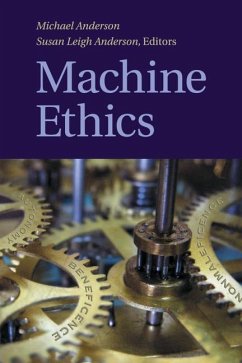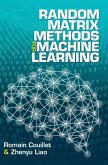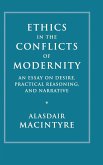Machine Ethics
Herausgeber: Anderson, Michael; Anderson, Susan Leigh
Machine Ethics
Herausgeber: Anderson, Michael; Anderson, Susan Leigh
- Broschiertes Buch
- Merkliste
- Auf die Merkliste
- Bewerten Bewerten
- Teilen
- Produkt teilen
- Produkterinnerung
- Produkterinnerung
The subject of this book is a new field of research: developing ethics for machines, in contrast to developing ethics for human beings who use machines. The essays in this volume represent the first steps by philosophers and artificial intelligence researchers toward explaining why it is necessary to add an ethical dimension to machines that function autonomously.
Andere Kunden interessierten sich auch für
![Ethics in the Conflicts of Modernity Ethics in the Conflicts of Modernity]() Alasdair MacIntyre (Indiana University of Notre Dame)Ethics in the Conflicts of Modernity25,99 €
Alasdair MacIntyre (Indiana University of Notre Dame)Ethics in the Conflicts of Modernity25,99 €![Moral Passion and Christian Ethics Moral Passion and Christian Ethics]() Robin Gill (University of Sussex)Moral Passion and Christian Ethics123,99 €
Robin Gill (University of Sussex)Moral Passion and Christian Ethics123,99 €![Random Matrix Methods for Machine Learning Random Matrix Methods for Machine Learning]() Romain CouilletRandom Matrix Methods for Machine Learning92,99 €
Romain CouilletRandom Matrix Methods for Machine Learning92,99 €![The Cambridge Handbook of the Ethics of Ageing The Cambridge Handbook of the Ethics of Ageing]() The Cambridge Handbook of the Ethics of Ageing100,99 €
The Cambridge Handbook of the Ethics of Ageing100,99 €![Ethics in the Conflicts of Modernity Ethics in the Conflicts of Modernity]() Alasdair MacIntyre (Indiana University of Notre Dame)Ethics in the Conflicts of Modernity52,99 €
Alasdair MacIntyre (Indiana University of Notre Dame)Ethics in the Conflicts of Modernity52,99 €![Aristotle's Nicomachean Ethics Book X Aristotle's Nicomachean Ethics Book X]() Aristotle's Nicomachean Ethics Book X160,99 €
Aristotle's Nicomachean Ethics Book X160,99 €![Practical Ethics Practical Ethics]() Peter Singer (New Jersey Princeton University)Practical Ethics118,99 €
Peter Singer (New Jersey Princeton University)Practical Ethics118,99 €-
-
-
The subject of this book is a new field of research: developing ethics for machines, in contrast to developing ethics for human beings who use machines. The essays in this volume represent the first steps by philosophers and artificial intelligence researchers toward explaining why it is necessary to add an ethical dimension to machines that function autonomously.
Hinweis: Dieser Artikel kann nur an eine deutsche Lieferadresse ausgeliefert werden.
Hinweis: Dieser Artikel kann nur an eine deutsche Lieferadresse ausgeliefert werden.
Produktdetails
- Produktdetails
- Verlag: Cambridge University Press
- Seitenzahl: 548
- Erscheinungstermin: 29. März 2018
- Englisch
- Abmessung: 234mm x 156mm x 30mm
- Gewicht: 842g
- ISBN-13: 9781108461757
- ISBN-10: 1108461751
- Artikelnr.: 52417205
- Herstellerkennzeichnung
- Libri GmbH
- Europaallee 1
- 36244 Bad Hersfeld
- gpsr@libri.de
- Verlag: Cambridge University Press
- Seitenzahl: 548
- Erscheinungstermin: 29. März 2018
- Englisch
- Abmessung: 234mm x 156mm x 30mm
- Gewicht: 842g
- ISBN-13: 9781108461757
- ISBN-10: 1108461751
- Artikelnr.: 52417205
- Herstellerkennzeichnung
- Libri GmbH
- Europaallee 1
- 36244 Bad Hersfeld
- gpsr@libri.de
Part I. The Nature of Machine Ethics: 1. The nature, importance, and
difficulty of machine ethics James Moor; 2. Machine metaethics Susan Leigh
Anderson; 3. Ethics for machines J. Storrs Hall; Part II. The Importance of
Machine Ethics: 4. Why machine ethics? Colin Allen, Wendell Wallach and Iva
Smit; 5. Authenticity in the age of digital companions Sherry Turkel; Part
III. Issues Concerning Machine Ethics: 6. What matters to a machine? Drew
McDermott; 7. Machine ethics and the idea of a more-than-human moral world
Steve Torrance; 8. On computable morality: an examination of machines as
moral advisors Blay Whitby; 9. When is a robot a moral agent? John Sullins;
10. Philosophical concerns with machine ethics Susan Leigh Anderson; 11.
Computer systems: moral ethics but not moral agents Deborah G. Johnson; 12.
On the morality of artificial agents Luciano Floridi; 13. Legal rights for
machines: some fundamental concepts David J. Calverley; Part IV. Approaches
to Machine Ethics: 14. Towards the ethical robot James Gips; 15. Asimov's
laws of robotics: implications for information technology Roger Clarke; 16.
The unacceptability of Asimov's 'three laws of robotics' as a basis for
machine ethics Susan Leigh Anderson; 17. Computational models of ethical
reasoning: challenges, initial steps, and future directions Bruce McLaren;
18. Computational neural modeling and the philosophy of ethics: reflections
on the particularism-generalism debate Marcello Guarini; 19. Architectures
and ethics for robots: constraint satisfaction as a unitary design
framework Alan K. Mackworth; 20. Piagetian roboethics via category theory:
moving beyond mere formal operations to engineer robots whose decisions are
guaranteed to be ethically correct Selmer Bringsjord, Joshua Taylor, Bram
van Heuveln, Konstantine Arkoudas, Micah Clark and Ralph Wojtowicz; 21.
Ethical protocols design Matteo Turilli; 22. Modelling morality with
prospective logic Luis Moniz Pereira and Ari Saptawijaya; 23. An integrated
reasoning approach to moral decision-making Morteza Dehghani, Ken Forbus,
Emmett Tomai and Matthew Klenk; 24. Prototyping n-reasons: a computer
mediated ethics machine Peter Danielson; 25. There is no 'I' in 'robot':
robots and utilitarianism Christopher Grau; 26. Prospects for a Kantian
machine Thomas M. Powers; 27. A prima facie duty approach to machine
ethics: machine learning of features of ethical dilemmas, prima facie
duties and decision principles, through a dialogue with ethicists Susan
Leigh Anderson and Michael Anderson; Part V. Visions for Machine Ethics:
28. What can AI do for ethics? Helen Seville and Debora G. Field; 29.
Ethics for self-improving machines J. Storrs Hall; 30. How machines might
help us to achieve breakthroughs in ethical theory and inspire us to behave
better Susan Leigh Anderson; 31. Homo sapiens 2.0: building the better
robots of our nature Eric Dietrich.
difficulty of machine ethics James Moor; 2. Machine metaethics Susan Leigh
Anderson; 3. Ethics for machines J. Storrs Hall; Part II. The Importance of
Machine Ethics: 4. Why machine ethics? Colin Allen, Wendell Wallach and Iva
Smit; 5. Authenticity in the age of digital companions Sherry Turkel; Part
III. Issues Concerning Machine Ethics: 6. What matters to a machine? Drew
McDermott; 7. Machine ethics and the idea of a more-than-human moral world
Steve Torrance; 8. On computable morality: an examination of machines as
moral advisors Blay Whitby; 9. When is a robot a moral agent? John Sullins;
10. Philosophical concerns with machine ethics Susan Leigh Anderson; 11.
Computer systems: moral ethics but not moral agents Deborah G. Johnson; 12.
On the morality of artificial agents Luciano Floridi; 13. Legal rights for
machines: some fundamental concepts David J. Calverley; Part IV. Approaches
to Machine Ethics: 14. Towards the ethical robot James Gips; 15. Asimov's
laws of robotics: implications for information technology Roger Clarke; 16.
The unacceptability of Asimov's 'three laws of robotics' as a basis for
machine ethics Susan Leigh Anderson; 17. Computational models of ethical
reasoning: challenges, initial steps, and future directions Bruce McLaren;
18. Computational neural modeling and the philosophy of ethics: reflections
on the particularism-generalism debate Marcello Guarini; 19. Architectures
and ethics for robots: constraint satisfaction as a unitary design
framework Alan K. Mackworth; 20. Piagetian roboethics via category theory:
moving beyond mere formal operations to engineer robots whose decisions are
guaranteed to be ethically correct Selmer Bringsjord, Joshua Taylor, Bram
van Heuveln, Konstantine Arkoudas, Micah Clark and Ralph Wojtowicz; 21.
Ethical protocols design Matteo Turilli; 22. Modelling morality with
prospective logic Luis Moniz Pereira and Ari Saptawijaya; 23. An integrated
reasoning approach to moral decision-making Morteza Dehghani, Ken Forbus,
Emmett Tomai and Matthew Klenk; 24. Prototyping n-reasons: a computer
mediated ethics machine Peter Danielson; 25. There is no 'I' in 'robot':
robots and utilitarianism Christopher Grau; 26. Prospects for a Kantian
machine Thomas M. Powers; 27. A prima facie duty approach to machine
ethics: machine learning of features of ethical dilemmas, prima facie
duties and decision principles, through a dialogue with ethicists Susan
Leigh Anderson and Michael Anderson; Part V. Visions for Machine Ethics:
28. What can AI do for ethics? Helen Seville and Debora G. Field; 29.
Ethics for self-improving machines J. Storrs Hall; 30. How machines might
help us to achieve breakthroughs in ethical theory and inspire us to behave
better Susan Leigh Anderson; 31. Homo sapiens 2.0: building the better
robots of our nature Eric Dietrich.
Part I. The Nature of Machine Ethics: 1. The nature, importance, and
difficulty of machine ethics James Moor; 2. Machine metaethics Susan Leigh
Anderson; 3. Ethics for machines J. Storrs Hall; Part II. The Importance of
Machine Ethics: 4. Why machine ethics? Colin Allen, Wendell Wallach and Iva
Smit; 5. Authenticity in the age of digital companions Sherry Turkel; Part
III. Issues Concerning Machine Ethics: 6. What matters to a machine? Drew
McDermott; 7. Machine ethics and the idea of a more-than-human moral world
Steve Torrance; 8. On computable morality: an examination of machines as
moral advisors Blay Whitby; 9. When is a robot a moral agent? John Sullins;
10. Philosophical concerns with machine ethics Susan Leigh Anderson; 11.
Computer systems: moral ethics but not moral agents Deborah G. Johnson; 12.
On the morality of artificial agents Luciano Floridi; 13. Legal rights for
machines: some fundamental concepts David J. Calverley; Part IV. Approaches
to Machine Ethics: 14. Towards the ethical robot James Gips; 15. Asimov's
laws of robotics: implications for information technology Roger Clarke; 16.
The unacceptability of Asimov's 'three laws of robotics' as a basis for
machine ethics Susan Leigh Anderson; 17. Computational models of ethical
reasoning: challenges, initial steps, and future directions Bruce McLaren;
18. Computational neural modeling and the philosophy of ethics: reflections
on the particularism-generalism debate Marcello Guarini; 19. Architectures
and ethics for robots: constraint satisfaction as a unitary design
framework Alan K. Mackworth; 20. Piagetian roboethics via category theory:
moving beyond mere formal operations to engineer robots whose decisions are
guaranteed to be ethically correct Selmer Bringsjord, Joshua Taylor, Bram
van Heuveln, Konstantine Arkoudas, Micah Clark and Ralph Wojtowicz; 21.
Ethical protocols design Matteo Turilli; 22. Modelling morality with
prospective logic Luis Moniz Pereira and Ari Saptawijaya; 23. An integrated
reasoning approach to moral decision-making Morteza Dehghani, Ken Forbus,
Emmett Tomai and Matthew Klenk; 24. Prototyping n-reasons: a computer
mediated ethics machine Peter Danielson; 25. There is no 'I' in 'robot':
robots and utilitarianism Christopher Grau; 26. Prospects for a Kantian
machine Thomas M. Powers; 27. A prima facie duty approach to machine
ethics: machine learning of features of ethical dilemmas, prima facie
duties and decision principles, through a dialogue with ethicists Susan
Leigh Anderson and Michael Anderson; Part V. Visions for Machine Ethics:
28. What can AI do for ethics? Helen Seville and Debora G. Field; 29.
Ethics for self-improving machines J. Storrs Hall; 30. How machines might
help us to achieve breakthroughs in ethical theory and inspire us to behave
better Susan Leigh Anderson; 31. Homo sapiens 2.0: building the better
robots of our nature Eric Dietrich.
difficulty of machine ethics James Moor; 2. Machine metaethics Susan Leigh
Anderson; 3. Ethics for machines J. Storrs Hall; Part II. The Importance of
Machine Ethics: 4. Why machine ethics? Colin Allen, Wendell Wallach and Iva
Smit; 5. Authenticity in the age of digital companions Sherry Turkel; Part
III. Issues Concerning Machine Ethics: 6. What matters to a machine? Drew
McDermott; 7. Machine ethics and the idea of a more-than-human moral world
Steve Torrance; 8. On computable morality: an examination of machines as
moral advisors Blay Whitby; 9. When is a robot a moral agent? John Sullins;
10. Philosophical concerns with machine ethics Susan Leigh Anderson; 11.
Computer systems: moral ethics but not moral agents Deborah G. Johnson; 12.
On the morality of artificial agents Luciano Floridi; 13. Legal rights for
machines: some fundamental concepts David J. Calverley; Part IV. Approaches
to Machine Ethics: 14. Towards the ethical robot James Gips; 15. Asimov's
laws of robotics: implications for information technology Roger Clarke; 16.
The unacceptability of Asimov's 'three laws of robotics' as a basis for
machine ethics Susan Leigh Anderson; 17. Computational models of ethical
reasoning: challenges, initial steps, and future directions Bruce McLaren;
18. Computational neural modeling and the philosophy of ethics: reflections
on the particularism-generalism debate Marcello Guarini; 19. Architectures
and ethics for robots: constraint satisfaction as a unitary design
framework Alan K. Mackworth; 20. Piagetian roboethics via category theory:
moving beyond mere formal operations to engineer robots whose decisions are
guaranteed to be ethically correct Selmer Bringsjord, Joshua Taylor, Bram
van Heuveln, Konstantine Arkoudas, Micah Clark and Ralph Wojtowicz; 21.
Ethical protocols design Matteo Turilli; 22. Modelling morality with
prospective logic Luis Moniz Pereira and Ari Saptawijaya; 23. An integrated
reasoning approach to moral decision-making Morteza Dehghani, Ken Forbus,
Emmett Tomai and Matthew Klenk; 24. Prototyping n-reasons: a computer
mediated ethics machine Peter Danielson; 25. There is no 'I' in 'robot':
robots and utilitarianism Christopher Grau; 26. Prospects for a Kantian
machine Thomas M. Powers; 27. A prima facie duty approach to machine
ethics: machine learning of features of ethical dilemmas, prima facie
duties and decision principles, through a dialogue with ethicists Susan
Leigh Anderson and Michael Anderson; Part V. Visions for Machine Ethics:
28. What can AI do for ethics? Helen Seville and Debora G. Field; 29.
Ethics for self-improving machines J. Storrs Hall; 30. How machines might
help us to achieve breakthroughs in ethical theory and inspire us to behave
better Susan Leigh Anderson; 31. Homo sapiens 2.0: building the better
robots of our nature Eric Dietrich.








